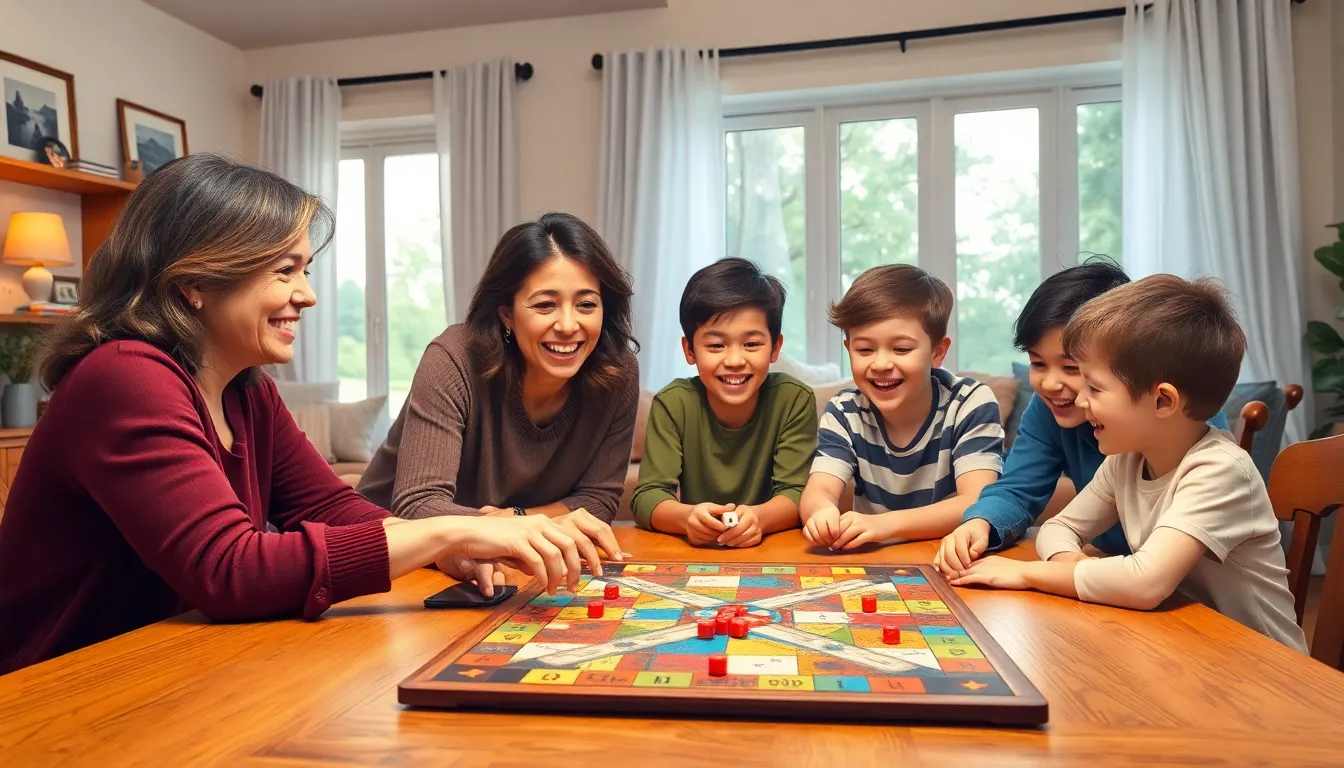Table of Contents
ToggleIn a world dominated by screens and digital distractions, traditional family games offer a delightful escape back to simpler times. Remember those epic battles over Monopoly or the laughter-filled chaos of charades? These games not only entertain but also strengthen bonds, creating memories that last a lifetime.
Overview of Traditional Family Games
Traditional family games hold a cherished place in many households. Families engage in activities like playing board games, outdoor sports, and card games. These games often inspire laughter, enjoyment, and collaboration among participants.
Monopoly remains a classic choice among family favorites. Players navigate property purchases and transactions while competing for financial dominance. Charades, on the other hand, encourages creativity and non-verbal communication. Teams act out words or phrases, generating excitement and humor.
Outdoor games also play a significant role in family bonding. Activities like sack races, capture the flag, and frisbee foster physical activity and teamwork. Families create lasting memories as they engage in friendly competition.
Card games, such as Uno or Go Fish, continue to be popular, appealing to various age groups. Simple rules make these games accessible, ensuring everyone can participate. They promote strategic thinking while providing ample opportunities for social interaction.
In addition to enjoyment, traditional family games support vital skill development. Players enhance critical thinking, problem-solving abilities, and communication skills through these interactive formats. Engaging in these experiences strengthens familial relationships and creates a sense of belonging.
In a world dominated by technology, prioritizing traditional family games offers a refreshing break. Choosing to embrace these activities fosters connection and creativity, reinforcing the importance of time spent together. Families looking to escape the digital noise find joy in these timeless pastimes.
Popular Traditional Family Games


Traditional family games encompass a variety of types, each offering unique experiences. These games encourage interaction, laughter, and skill development.
Board Games
Board games create opportunities for close family interactions. Monopoly often ranks high among favorites, engaging players in strategic property transactions. Clue adds an element of mystery and deduction, challenging participants to solve a murder before their opponents. Other classic options include Scrabble, which promotes vocabulary-building, and The Game of Life, simulating life choices and their consequences. Families tend to gather around the board for hours, fostering connections through friendly competition.
Outdoor Games
Outdoor games encourage physical activity and teamwork. Capture the Flag captivates with its elements of strategy and sneaky maneuvers. Sack races bring out laughter as players hop to the finish line. Frisbee provides a laid-back option, promoting casual fun in local parks. Families often enjoy organizing relay races, where speed and cooperation shine. Through these games, participants strengthen bonds while enjoying fresh air and sunlight.
Card Games
Card games appeal to various age groups with their simple rules and fast-paced play. Uno remains popular for its colorful cards and exciting gameplay, offering a mix of skill and luck. Go Fish entertains younger players with its straightforward rules, teaching them about matching and memory. Family members often enjoy games like Crazy Eights and Poker, which can bring out competitive spirits, regardless of skill level. Through these card games, families engage together, honing strategic thinking and enhancing social skills.
Benefits of Playing Traditional Family Games
Traditional family games offer numerous advantages that enhance family dynamics and personal development. Engaging in these activities provides opportunities for meaningful interactions.
Strengthening Family Bonds
Playing family games cultivates deeper connections among family members. Board games and outdoor activities naturally encourage collaboration, leading to shared experiences that nurture relationships. Laughter and friendly competition foster a supportive environment. As family members engage, they create lasting memories that help reinforce familial ties. These moments bring families together, allowing them to appreciate each other’s company amidst daily distractions.
Encouraging Communication
Traditional games serve as effective tools for improving communication skills. Players must articulate thoughts and strategies during games like charades or Scrabble. Non-verbal games also stimulate creativity, prompting players to express themselves without words. It’s common to see family members discussing strategies, negotiating during turns, or celebrating achievements together. These interactions stimulate open dialogue and facilitate understanding, fostering stronger communication habits.
Promoting Physical Activity
Outdoor games promote health through physical activity and teamwork. Activities like sack races or capture the flag engage participants of all ages, transforming playtime into exercise. Such involvement creates opportunities for movement while also developing teamwork skills. Through competition and collaboration, family members strengthen bonds while enjoying the benefits of an active lifestyle. Encouraging kids to participate in physical games lays the groundwork for healthy habits that extend into adulthood.
How to Choose the Right Game for Your Family
Choosing the right game for a family gathering involves considering various factors that can enhance the experience.
Consider Age Differences
Age differences play a crucial role in game selection. Family members range from toddlers to grandparents, so picking a game that appeals to all ages maximizes engagement. Simple games like Uno can captivate young children while providing strategic depth for older players. Moreover, games such as charades promote creativity and participation, making them suitable for various age groups. Balancing complexity and ease ensures that everyone can join in the fun without feeling overwhelmed or bored.
Assessing Interests
Assessing interests within the family is essential for game selection. Each family member may have unique preferences, whether they enjoy competitive games like Monopoly or collaborative ones like Pictionary. Polling family members before game night can reveal popular choices and foster excitement. Furthermore, opting for games with themes that resonate with the family, like trivia on shared interests, enhances enjoyment. Aligning game choices with individual interests encourages enthusiastic participation and creates lasting memories.
Embracing traditional family games offers a valuable way to reconnect in an increasingly digital world. These games not only entertain but also strengthen family ties through shared laughter and collaboration. By choosing activities that cater to all ages and interests, families can create memorable experiences that foster communication and teamwork.
Whether it’s the strategic depth of Monopoly or the lively energy of outdoor games, each session brings unique moments that enrich family life. Prioritizing these interactions ensures that families continue to bond and grow together, making the most of their time spent with one another.




